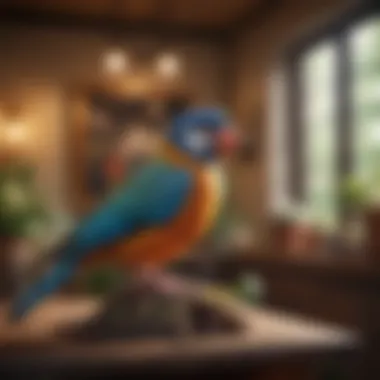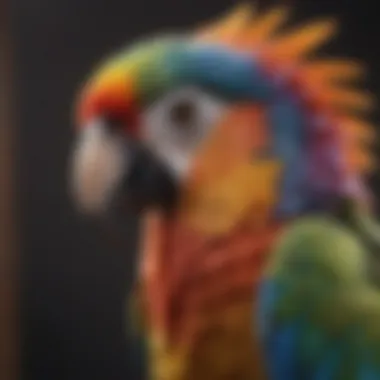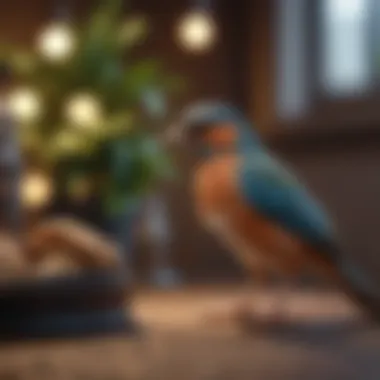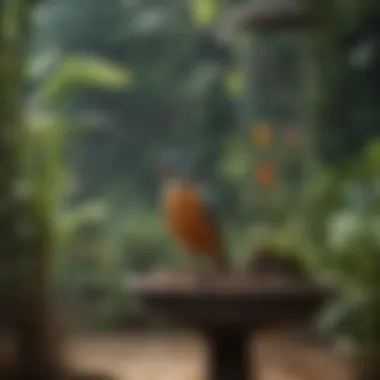Understanding the Legal Aspects of Bird Ownership in India


Intro
Keeping pet birds in India is gaining popularity. However, like any pet ownership, it comes with responsibilities and legal obligations. Avian enthusiasts must navigate the cultural sensitivities and legal aspects that regulate the pet trade within the country. This article clarifies these legal frameworks and shares crucial insights on the ethical considerations of caring for birds as pets.
Understanding the foundational aspects of bird care remains critical for potential ■awners. Those who aspire to have birds need to comprehend the needs of different species, the upkeep of their habitat, their health, and more. This ensures better animal welfare and aligns with the regulations currently laid down in India.
Avian Care Basics
Taking care of pet birds involves multifaceted responsibilities that necessitate thorough knowledge and preparation.
Importance of Proper Nutrition
Birds require a specific diet that varies from species to species. Seed mixes may not provide all nutritional needs. A balanced diet should include seeds, grains, fresh fruits, and vegetables. Providing the right food keeps their feathers healthy and supports overall well-being.
Understanding Bird Species and Their Needs
Each bird species has unique characteristics and requirements. Popular pet birds in India include budgerigars, lovebirds, and parrots. It's essential to research and understand the specific needs of the species you wish to have. Realizing how your potential pet behaves will foster a more harmonious living arrangement.
Basics of Birds Habitat Setup
A properly set up habitat offers birds safety and comfort. Depending on the species, set up their cages with adequate space, perches, and toys that allow them to explore and exercise. Ensure that habitats are placed in quieter areas of the home, away from direct sunlight and draughts, to promote better living conditions for your birds.
Grooming and Hygiene Tips
Regular cleaning maintains hygiene in your bird's environment. Regularly cleanse the cages, replace bedding, and provide opportunities for bathing. Bathing can help in keeping feathers clean while promoting bonding.
Interacting with Your Pet Bird
Thinking about how owners interact with their birds implies understanding the basics of developing trust and connection. Interactions greatly affect the emotional and mental well-being of birds.
Building Trust and Connection
Establishing trust with your bird can be gradual. Start by spending quiet time near the cage, talking softly. Allow your pet to explore you through a gradual process rather than forcing it to interact. Your patience can make a notable difference in developing a friendship.
Training Techniques and Tips
Training not only enhances communication but also gives mental stimulation. Use positive reinforcement like treats when your bird performs desired behaviors. Simple commands can enrich both their lives and yours.
Fun Activities for Bird Owners and Their Birds
Engaging activities can be thrilling for both owner and pet. Activities such as teaching tricks can foster a loving bond. Offer various repetition challenges and toys that stimulate curiosity.
Recognizing Bird Cues and Behaviors
Understanding birds’ body languages and noises aids in fostering better communication. Different species exhibit unique cues that reveal their moods. For example, fluffed-up feathers might indicate comfort, while sudden retreat could mean fear or dislike.
Emotional Well-Being of Birds
To confront the challenges owners face in ensuring emotional health requires active engagement. This includes providing avenues for play and socialization.
The Role of Play and Socialization
Playtime and interaction enhance overall happiness. Engage them with toys and training that simulate their natural behaviors. Socialization ensures birds feel safe and secure.
Understanding Avian Ownership
Understanding the legalities and responsibilities of keeping birds as pets is essential for prospective and current bird owners in India. As the bond between humans and birds can flourish through proper knowledge and care, this topic sheds light on what it truly means to own avian pets. With increasing interest in bird ownership, it is imperative to comprehend the nuances of responsible caregiving and the pressing legal framework governing this domain.


Defining Pet Birds
When we talk about pet birds, we refer not just to domestic species commonly kept for companionship, but to a variety of birds, including parrots, finches, canaries, and even doves among others. Each of these species brings unique traits, requirements, and legal obligations.
A pet bird has distinct needs in terms of their diet, habitat, and social environments. Understanding what defines a pet bird requires a deep concern for their welfare and legal protections. This understanding is vital not only for the well-being of the bird but also to ensure compliance with relevant laws and regulations under the jurisdiction of India.
Cultural Significance of Birds in India
Birds hold a prominent place in Indian culture and mythology. From ancient scriptures to art forms, avian life is celebrated widely. Birds are often viewed as symbols of freedom, beauty, and grace. Many communities in India have cultivated a rich tradition of bird watching and birdkeeping. How we view birds culturally influences how we perceive and treat them as pets.
Moreover, many species of birds have associations with festivals and rituals, symbolizing prosperity, joy, and good fortune. Such connections make it critical to preserve both the natural habitats and the trained care of birds in urban contexts. As one's inclination towards bird ownership grows, a deep respect for their cultural representations and significance fosters a more responsible approach toward avian companions.
The relationship between birds and humans in Indian society is complex and rooted in history, demanding an informed ownership that respects these ties.
Understanding the overlap between cultural practices and legal stipulations behind keeping birds will enable owners to recognize the moral implications involved. Awareness is not just beneficial but necessary in guiding future practices in bird ownership across the country.
Legal Framework Governing Pet Birds in India
Understanding the legal framework governing pet birds in India is crucial for both current and aspiring bird owners. The regulations ensure protectin against illegal capture and trade, preserving biodiversity and welfare of avian species. With a solid grasp of the legal guidelines, owners can avoid fines and legal repercussions while ensuring that their pet birds are acquired and kept in a responsible maner. This section explores the three major legislative paradigms guideing the ownership of pet birds in India: the Wildlife Protection Act, The Indian Penal Code, and CITES along with other international regulations.
Wildlife Protection Act
The Wildlife Protection Act, enacted in 1972, is the foundation for protecting wild fauna and flora in India. This law effectively prohibits the hunting, capturing, and trade of endangered and protected species, including specific species of birds that are commonly kept as pets. Under this act, many native bird species such as the Indian Parakeet and the Rose-ringed Parakeet are classified as protected.
Individual states in India may add additional protections depending on local wildlife conservation needs. Bird owners should acquaint themselves with these cllificaitons and consult local wildlife departments for further clarification on legal restrictions.
The Indian Penal Code
While the Indian Penal Code, formulated in 1860, predominantly pertains to offenses and punishments in penel matters, it intersects with wildlife laws as some offenses can lead to severe penalties especially tied to illegal wildlife trade. Offenderes might be penalized with imprisonment or financial penalties if they breach the provisions outlined in these laws. Bird owners must be vigilant as the legal implication of unlawfully keeping a bird can result in legal consent. It is thus important to ensure that all avian pets comply with relevant regulations.
CITES and International Regulations
CITES, or the Convention on International Trade in Endangered Species, establishes a framework that governs the international trade of threatened and endangered species, birds included. India ratified CITES in 1976, and it mandates permits for both the import and export of certain bird species.
Maintaining adherence to CITES is essential for bird owners involved in international transport of their pets. Failure to produce connections and references can result in confiscations or fines. The overall essence of these international agreements regulates domestic transactions resonant to global standards, helping preserve species on the brink of extinction.
"Understanding the framework of laws protecting birds not only keeps you within the confines of legality but also ensures that you are playing a part in conserving avian diversity."
Recognizing the complexities involved in possessing pet birds can only elevated responsible ownership within the avian community through legal adherence.
Permitted Bird Species
Understanding permitted bird species is crucial for any individual looking to enter the realm of pet avian ownership. This section outlines the types of species that are legally recognized within India and emphasizes the responsibilities attached to each. Knowledge of these regulations guides prospective owners, providing a strong foundation for informed decision-making. It also facilitates proper care and support for each species, ensuring responsible avian companionship.
Common Pet Birds and Their Legal Status
In India, certain birds have been distinctly categorized as common pet birds, thus legally permitting their ownership. Some examples include the Budgerigar, commonly known as the budgie, Lovebirds, and Cockatiels. These birds are not only popular choices due to their vibrant personalities and manageability, but they are also a legal familiarization point for most bird-owning households.
It's notable that owners wishing to have these birds should always source them from reputable breeders or pet shops that comply with all regulations. Acquiring birds through undisclosed or illegal channels may not only violate laws but also contribute to the unethical treatment of avian life.
Since these species enjoy considerable legal status, responsible ownership entails a commitment to meet their social, emotional, and health needs, cultivating a positive bond shared between the bird and its owner. Further, understanding proper housing requirements and dietary specifications from a legal and ethical standpoint becomes important to ensure their welfare.
Exotic Birds: Restrictions and Regulations
Pursuing the ownership of exotic bird species in India involves a more complex landscape of restrictions and regulations. While exotic birds such as African Grey Parrots or Macaws may appeal to ambitious bird enthusiasts, classification under the law defines clear guidelines regarding their ownership.
Many exotic species are safeguarded under various wildlife protection laws due to threats faced in their natural habitats. The acquisition process for these birds typically demands specific documentation, such as permits, that validate their legal ownership. This entails rigorous checking to dismiss ownership arising from illegal wildlife trade.


For example, before engaging with exotic birds, one should inquire with the Wildlife Protection Act of 1972, as it provides a comprehensive list detailing which foreign species might require a license and answer questions pertaining to listings under CITES. Checking with certified breeders must guide exotic bird acquisition to ensure alignment with legal frameworks in place.
The consequences of failing to adhere to regulations can range from legal penalties to animal seizures. Therefore, grasping the restrictions around exotic birds is fundamental for potential owners. It fortifies awareness of ethical standards and concerted efforts to enhance the welfare of both native and exotic avian populations.
Key Takeaway: Familiarizing one’s self with the legal status of both common and exotic bird species shrines the path of ethical ownership and conservation governance for pet birds in India.
Acquisition of Pet Birds
Understanding the acquisition of pet birds is essential in the context of legalities surrounding avian ownership in India. Proper acquisition ensures legal compliance, which is vital for responsible pet ownership. This section will detail recognized-buying channels, the necessity for relevant documentation, and considerations before selecting a pet bird.
Legal Channels for Purchase
Knowing where to acquire a pet bird legally is crucial to both protect legal compliance and promote ethically responsible sourcing. In India, potential bird owners should prioritize obtaining birds from various legal sources. These include:
- Licensed Breeders: Always opt for registered breeders who have the required licenses. Having a license ensures that they adhere to laws that promote the humane treatment of birds.
- Pet Stores: Established pet stores that function within the regulatory framework can be a reliable source. Check if they follow ethical practices regarding animal care and sell only legal bird species.
- Avian Rescues or Sanctuaries: Consider adopting from avian rescue centers. They often have birds looking for homes, and adopting can help reduce the population of unhomed pets.
- Bird Shows: Events such as bird exhibitions and trade fairs provide opportunities to meet breeders and learn more about bird care before making the acquisition.
In verifying the reliability of these channels, always ask about the origin of the bird and request to see the necessary papers validating its species and legality.
Documentation and Permits
Documentation is a vital component of legal pet bird ownership in India. The legitimacy of bird acquisition depends on maintaining proper papers and obtaining necessary permits where applicable. Here are some critical documents to consider:
- Authorization Papers: Always ask for a certificate or paper willingly provided that acknowledges the source of the bird. This includes requisite licenses showing legal breeding and selling practices.
- CITES Permits: For exotic birds, be prepared to obtain CITES documentation if required. These permits ensure no endangered species is unintentionally sourced or sold without regulation.
- Vaccination Records: It is advantageous to ask for veterinary health records or vaccination status proof. Healthy birds less likely struggle with legal issues down line contribute safeguards against future stress.
- Adoption Agreement: If adopting a bird, maintain printed documents outlining become custodial responsibility under the standards of organization facilitating adoption.
Proper documentation not only protects you legally, but it also ensures that you are taking home a bird that has been cared for correctly.
Potential pet owners should recognize these steps may appear tedious, but they promote a positive experience both as custodians of eastern birds and environmental mindfulness. A cautious approach while acquiring pet birds establishes a care-ready relationship without legal hindrances.
Owner Responsibilities and Ethical Considerations
Importance of Owner Responsibilities and Ethical Considerations
Owning a pet bird comes with substantial duties. These responsibilities extend beyond mere provision of food and water. Understanding the ethical implications of bird ownership is vital for the well-being of these avian companions. This section underscores how a conscientious approach to pet ownership can ensure a better quality of life for birds while fostering a healthier human-animal bond.
To emphasize responsibility, potential bird owners must first acknowledge the commitment involved. Birds, unlike other pets, often exhibit long lifespans. For example, some parrots can live for over 50 years. This longevity requires owners to plan for both current and future needs of their birds, including ensuring they can provide a stable environment throughout their lives.
Proper Care and Habitat Requirements
Care and appropriate housing are fundamental to bird well-being. A suitable habitat must replicate natural conditions as closely as possible. The following elements should be prioritized:
- Cage Size: The cage should be large enough to allow the bird to stretch, flap its wings, and move freely. For small birds, 30 inches by 18 inches may suffice, while larger species require significantly bigger spaces.
- Perches and Toys: Offering diverse perches made from natural materials along with interactive toys will stimulate the bird both physically and mentally.
- Fresh Food and Water: Clean food and o should be accessible. A varied diet suited to the specific species should also be considered to promote optimal health.
At times, owners overlook the significance of environmental enrichment. This means providing stimulation through activities that mimic a bird's natural foraging behavior. Such considerations can prevent boredom and associated behavioral issues.
Social and Emotional Needs of Birds
Birds are social creatures who thrive on interaction. Entirely solitary confinement can lead to psychological distress, often manifesting in behavior problems. Addressing their social and emotional needs is part of responsible ownership:
- Companionship: Owners should interact regularly, whether through talking, playing, or simply being present. Social interaction is crucial for most bird species.
- Consider Multiple Birds: For some owners, housing more than one bird can be an excellent choice. When compatible species are kept together, they can engage with each other, which often leads to healthier dynamics.
- Observation of Behavior: Being attentive to a bird's demeanor is essential. Changes in behavior can indicate stress, underlying health issues, or simply a need for more interaction.
Important note: Satisfactory attention enhances the quality of life for pet birds, reduce anxiety and cohesiveness between pets and their owners.
In summary, recognizing what is required—both athletically and emotionally—for maintaining healthy pet birds fosters responsible ownership. It safeguards the welfare of the birds as well, ensuring that the experience remains enriching for both the pet and the owner.
Penalties for Illegal Bird Ownership
Understanding the penalties for illegal bird ownership in India is crucial for several reasons. Unlawful possession of birds can lead not only to legal repercussions but also endangers the avian population and contributes to environmental degradation. Educating potential bird owners about these penalties can often discourage illegal activities, ensuring that pets remain within the bounds of the law. It also underscores the importance of obtaining birds through legal channels, fostering ethical practices within pet ownership.


Fines and Legal Consequences
In India, fines for illegal bird ownership are specified under various environmental laws, primarily the Wildlife Protection Act. Depending on the severity of the offense, these fines can range significantly. For minor infractions, an owner may face penalties of ₹10,000 to ₹25,000.
For more serious violations, such as ownership of protected or endangered species, the penalties can escalate to damaging amounts, including imprisonment.
It’s important to understand the potential legal consequences that one might face:
- Monetary Fines: Increased responsibility correlates directly with the fines. Higher penalties usually involve illegal trade or possession of endangered civiliztion birds.
- Imprisonment: Alongside fines, violators can serve time in prison, further tarnishing one's reputation.
- Seizure of Birds: Authorities will confiscate illegally owned birds, often leading to health and welfare concerns for the birds involved.
Case Studies of Legal Actions
Repercussions can become quite severe following legal actions against illegal bird owners. Various cases in India illustrate both the intent of the law and its enforcement.
One notable case involved the prosecution of a bird dealer in Delhi, who was found in possession of several endangered species, along with relevant illegal documents. The court led to a sentence of severe financial burden alongside community service aimed at public education on respecting wildlife. Such actions exemplify the judiciary's stance against illegal ownership, sending a clear message on the importance of avian legalities.
Another incident took place in Mumbai, where local authorities confiscated hundreds of illegal birds in a raid on an established pet store. This case highlighted the lack of knowledge among consumers regarding legal species and sources. Following the raid, the local government organized awareness campaigns to inform the public about the legal aspects of avian pet ownership.
These instances serve as both warnings and educational tools, further stregthening the need for legal compliance in the realm of pet birds.
Conservation and Avian Protection Efforts
Conservation and protection of birds is crucial in India due to the increasing threats posed by habitat loss, illegal trading, and climate change. Understanding the importance of these efforts helps ensure the sustainability of bird populations and their natural environments. When pet owners engage in conservation, they play an active role in preserving avian diversity and protecting wildlife regulations.
Role of Bird Sanctuaries and Rescues
Bird sanctuaries and rescue organizations serve essential functions in avian protection efforts. They provide shelter for injured, orphaned, and abandoned birds. In many cases, pet bird owners may need to relinquish their birds due to changing circumstances. These sanctuaries help by ensuring these birds receive care.
Some notable aspects of sanctuaries include:
- Habitat Restoration: Sanctuaries often work to restore native ecosystems, which supports not only captive birds but also local wildlife.
- Education and Awareness: Many sanctuaries drive public education efforts about the importance of respecting wildlife laws and responsible pet ownership.
- Research: These organizations contribute to research on avian behavior, health issues, and conservation strategies.
A few well-regarded sanctuaries in India include the Bharatpur Bird Sanctuary and the Jal Mahal Bird Sanctuary. They remain critical not only for the rehabilitation of birds but also for advancing conservation efforts and reinforcing community involvement. Bird sanctuaries highlight the responsibilities bird owners have to support proper care.
Community Initiatives for Bird Conservation
Community-driven initiatives play a significant role in promoting avian protection. Grassroots programs often mobilize citizens to take part in conservation through educational activities, awareness campaigns, and hands-on conservation work. When local communities contribute to conservation efforts, the impact becomes more profound.
Key components of such initiatives involve:
- Awareness Campaigns: Teaching communities about the rights and responsibilities of pet ownership can lessen illegal breeding and trade practices.
- Wildlife Protection Workshops: Training sessions can empower citizens to recognize unethical practices and promote stewardship of birds.
- Collaborations with NGOs: Non-governmental organizations frequently partner with communities to give insights into sustainable living aligned with conservation efforts.
Programs like Birds of a Feather, an initiative focused on training local leaders, illustrate effective modeling of conservation efforts.
Closure
The legal framework surrounding pet bird ownership in India is a complex landscape that intertwines wildlife conservation with the rights and responsibilities of pet owners. Understanding these legal obligations not only protects birds but also helps owners navigate the often ambiguous laws. Ignorance of the legalese that governs keeping these animals can lead to severe penalties.
Summary of Legal Obligations
Potential and current bird owners must be aware of their legal parameters including which species are permitted and the laws that come into play when acquiring and maintaining pet birds. Here's a summary of the critical obligations to consider:
- Permitted Species: Owners should familiarize themselves with species that are allowed under various laws, particularly the Wildlife Protection Act and CITES. Keeping an illegal species can result in confiscation or fines.
- Documentation: Acquiring pet birds legally involves obtaining appropriate permits and maintaining documentation for ownership.
- Ethical Considerations: Apart from legal obligations, ethical considerations—such as providing proper care, habitat, and socialization—are impacted significantly by these laws. Failure to meet ethical standards may bring legal consequences.
Understanding these aspects forms the foundation of responsible pet ownership and helps ensure the welfare of the birds in our care.
Future of Avian Ownership in India
The future of bird ownership in India hinges upon several dynamics. Increased awareness of conservation, stricter law enforcement, and changing public perceptions seem to shape upcoming trends. As society grows cognizant of ecological issues, there may be a pivotal shift towards prioritizing the health of bird species over the desire for companionship.
- Awareness Campaigns: Conservation efforts will likely entail public outreach to enlighten communities about the importance of protecting native avian species.
- Evolving Conversations: The bird ownership narrative may evolve, aligning with environmentalists' interests while embracing regulations that ensure ethical practices. Joint ventures between organizations can promote sustainable ownership models.
- Regulatory Developments: Enhancements or amendments in existing wildlife laws could emerge, making them even more relevant for bird owners.
These evolving elements indicate that avian ownership will not only transform legally but also ethically, ensuring the rights of birds are considered appropriate to their place in both ecosystems and homes.















